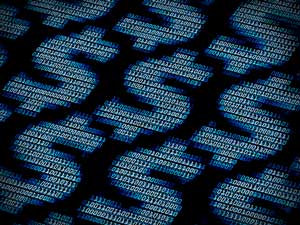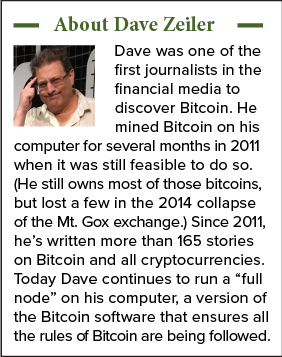Watch out for "Fedcoin."
That's what a cryptocurrency pegged to the U.S. dollar and issued by the U.S. Federal Reserve will be called.
While the government will sell Fedcoin as a win for citizens, a crypto version of the dollar will actually play a starring role in the death of cash. It will also give the government even more control over your money.

While hypothetical for now, there's good reason to believe the Fed is seriously considering the creation of a Fedcoin.
Of course, the Fed would prefer you believe otherwise. At a blockchain conference in April, Jim Cunha, senior vice president of treasury and financial services at the Federal Reserve Bank of Boston, threw cold water on the notion a Fedcoin is in the pipeline.
"Right now, I can tell you categorically, there is no plan to issue a Fedcoin at any specific date or time," Cunha said.
But we do know the Fed has been studying Bitcoin, cryptocurrencies, and blockchain technology for years. Just last year, the Fed published a research paper that explored how the blockchain can be used for payments, clearing, and settlement.
And Cunha's denial is extraordinarily narrow. Just because no Fedcoin launch date is set doesn't mean the Fed isn't working on the project behind closed doors.
Actually, it would be surprising if Fed officials weren't having private conversations about what a Fedcoin would look like.
BREAKING: New Legislation Could Turn Tiny Pot Stocks into Millions. Click Here...
And at least one Fed official has given Fedcoin a great deal of thought.
Over the past three years, David Andolfatto, a vice president of the St. Louis Federal Reserve Bank and a professor of economics at Simon Fraser University, has written about Fedcoin on his personal blog, given public presentations on it, and has discussed the idea in interviews.
Andolfatto points out his thoughts on Fedcoin aren't official Fed policy. But a Fed vice president publicly discussing the concept of "Fedcoin" speaks volumes. It's also possible the Fed is using Andolfatto's "unofficial" statements as a trial balloon to gauge reaction to the idea.
And bear in mind that the Federal Reserve isn't the only central bank looking at this...
Fiat Cryptocurrencies Like Fedcoin Will Be Commonplace
The Swedish central bank, the Riksbank, is thought to have made the most progress in the creation of its own fiat cryptocurrency.
The Riksbank has an advantage, in that Swedes already are dispensing with their cash. Transactions in cash have declined from 40% of all retail transactions in 2010 to just 10% today.
Other central banks known to be studying the idea of an official, national cryptocurrency include the Bank of Canada, the People's Bank of China, the Monetary Authority of Singapore, and the Deutsche Bundesbank. The PBOC even published a paper last year explaining how a crypto-yuan would work.
The Fed would be remiss if it wasn't exploring these same possibilities.
Don't Miss: How to Buy Bitcoins - Your Guide to Digital Profits
A lot of technical issues will need to be resolved to make fiat cryptocurrencies work. For example, many cryptocurrencies, like Bitcoin, are decentralized. A Fedcoin would be totally controlled by the Federal Reserve (and, by extension, the U.S. banking system).
For instance, the need for centralization raises questions about how the system would be secured to prevent double-spending and other fraudulent transactions. (Miners and users running "full nodes" with the entire blockchain serve that function in Bitcoin).
But whatever the hurdles, the Fed has several very strong incentives for pursuing Fedcoin. For one thing, it would be devilishly effective in wiping out cash...
Say Hello to "Fedcoin" and Goodbye to Your Cash
[mmpazkzone name="in-story" network="9794" site="307044" id="137008" type="4"]
Andolfatto says Fedcoin would improve on cash in that it could be designed to pay interest, much like a Treasury bill.
Such a feature would motivate many Americans to surrender their cash in favor of Fedcoin. Who wouldn't like getting paid just for holding a digital version of money you already have?
Of course, once all the cash has been exchanged for Fedcoin, Americans will get a rude shock.
Take the vast underground economy. That includes people getting paid "under the table," people who get tips, as well as a whole range of illegal activities (black markets, drugs, prostitution). And it's all fueled by cash.
A cashless society would cripple, if not destroy outright, the underground economy. And the government would rake in billions of additional tax revenue with the bonus of making a lot of common crimes much more difficult.
The government will use crime reduction as another selling point to convince Americans to adopt Fedcoin. It won't say much about the rest of the underground economy, though.
And the government will also gloss over the loss of anonymity cash provides.

Andolfatto has suggested Fedcoin would have some degree of anonymity to make it comparable to cash (and more appealing to wary citizens).
But Fedcoin could easily be coded to offer a kind of superficial anonymity. In other words, other people wouldn't be able to figure out where you spent your $200, but the folks at the Fed would be able to trace it. Law enforcement agencies would find this feature very handy.
Fedcoin would also give the Federal Reserve more flexibility in monetary policy during economic downturns.
That interest-bearing money that lured people into converting their cash to Fedcoin would become a tool for imposing negative interest rates. You'd have to pay the government interest on your money.
Holding money would cost you money, so it would behoove everyone to either spend or invest their Fedcoin as soon as they received it. The resulting stimulus to the U.S. economy would dwarf everything the Fed tried in the years following the 2008 financial crisis.
So if this happens - and it's really more of a question of when rather than if - here's what investors can do about it...
How to Survive the Fedcoin War on Cash
When Fedcoin rears its ugly head, you'll need to keep some in fiat form to pay your bills. But as much as possible, you'll want to put your money into alternatives less vulnerable to government control:
- Investments: Dividend-paying stocks as well as gold and silver will be much better places to park money you don't need right away. This will be especially true when the Fed imposes negative interest rates on Fedcoin.
- Cryptocurrencies: Ironically, the best defense against Fedcoin will be other cryptocurrencies. If Fedcoin becomes a reality, it's likely that cryptocurrencies will quickly become the new cash. Those that offer maximum anonymity, such as Dash, Zcash, and Monero, will see adoption skyrocket. They'll become the foundation of a new, crypto-based underground economy. Even if the government outlawed them, the decentralized nature of these cryptocurrencies would make them hard, if not impossible, to police.
A Pot "Bombshell" Just Hit Canada: For our neighbors to the north, it's shocking news. But it could be the best news of all time for marijuana stock investors. In fact, this single "bombshell" event could unleash a new pot stock boom that will blow the doors off anything we've seen up to this point. And by putting a couple of hundred bucks into a handful of tiny Canadian weed companies, you could pocket life-changing gains - turning a few hundred bucks into a fortune overnight. Watch this now to get all the details...
Follow me on Twitter @DavidGZeiler and Money Morning on Twitter @moneymorning, Facebook, or LinkedIn.
About the Author
David Zeiler, Associate Editor for Money Morning at Money Map Press, has been a journalist for more than 35 years, including 18 spent at The Baltimore Sun. He has worked as a writer, editor, and page designer at different times in his career. He's interviewed a number of well-known personalities - ranging from punk rock icon Joey Ramone to Apple Inc. co-founder Steve Wozniak.
Over the course of his journalistic career, Dave has covered many diverse subjects. Since arriving at Money Morning in 2011, he has focused primarily on technology. He's an expert on both Apple and cryptocurrencies. He started writing about Apple for The Sun in the mid-1990s, and had an Apple blog on The Sun's web site from 2007-2009. Dave's been writing about Bitcoin since 2011 - long before most people had even heard of it. He even mined it for a short time.
Dave has a BA in English and Mass Communications from Loyola University Maryland.



